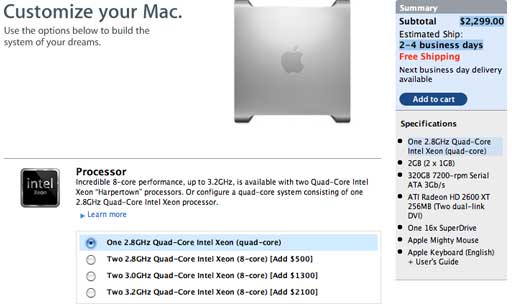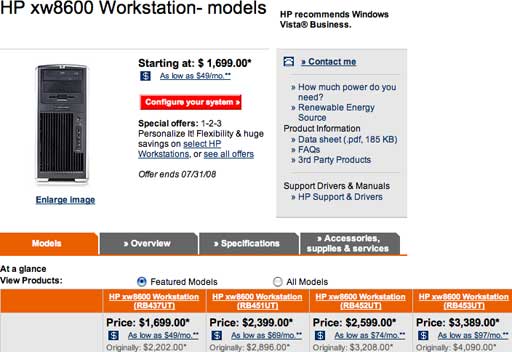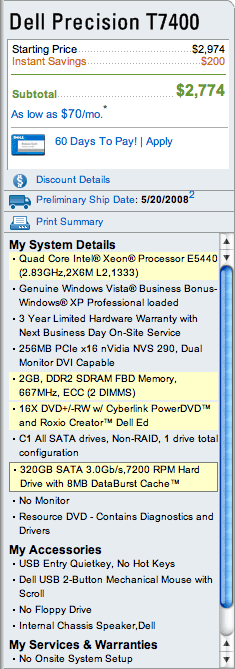You can say that Apple is incredibly good at marketing, but that
won't gain them market share for the long run. To match the marketing
message, you also need to beat the PC makers at their own game. This
means selling Macs for less money.
If you think that Macs are still being made in California or
Ireland,
where labor costs are high, it's time to wake up and smell the rice.
Taiwan is the home of several large electronic fabrication shop that
service HP, Apple, Dell, Acer, and others.
These large companies - including Quanta,
foxconn, and
Asustek - build most of the world's computers, especially laptops.
If the same contract manufactures are making almost all the computers,
then we can expect similarities in pricing. for similarly priced
computer goods, you'll find the prices are within $100 most of the
time. There will be specials that may knock off an extra $50 or give
you a free printer if you are lucky.
To lower prices, PC makers have been improving their supply chain
management. This is the key to lower computer prices and greater market
share. Dell in particular has used these improvements to battle for
market share.
A Level Field
The problem with this type of game, the other players catch on, and
you eventually loose your edge. HP eventually caught up to Dell, and
now we have Apple working to catch up with both of them. The playing
field is fairly level for everyone who contracts with these Taiwanese
companies.
So what, you may ask, if everyone is using these same contractors?
How does Apple beat these chumps at their own game?
The key to low price is mass production. The key to mass production
is making everything exactly the same. The key to making everything the
same: You have to reduce your product selection.
They tell you that Apple simplified its product line to make the
choice easier for consumers, but the pay off in a streamlined product
selection is cheaper manufacturing. Apple has one of the simplest
product lines in the market.
Let's compare desktops,
- Apple: Mac mini,
iMac, Mac Pro
- Dell: Inspiron 530, XPS One, XPS 210, XPS 420, XPS 630, XPS 720,
XPS 730
Looks like Apple wins for having fewer products. Worse for Dell, I
only listed the home computer models. They also have nine
different ones for business within three main model categories, Vostro,
Optiplex, and Precision Workstation. (Does anyone besides me think
these names stink?) All of these models also allows for custom
configurations to add to the complexity.
Sure any one of these models may out sell everything Apple makes,
but complexity is costing Dell and others money.
Money, in the form of margins, is where Apple shows its smarts.
Apple
earns 32.9%. If they forecast less, say 30%, then Apple stock
drops.
Dell comes in at 18.8%, and everyone thinks they are doing a great
job.
No, this doesn't prove that Macs cost more than Dells; it proves
that Apple is better at keeping its revenue.
We'll talk prices later.
Microsoft
Lest we forget Microsoft, they just reported
their annual earnings. These guys raked in $14.45 billion dollars
revenue in Q3 2008 that just ended. And they scored $4.41 billion in
operating income. That is Microsoft 's contribution to the cost of PC
computers. They like these costs to remain hidden so no one can
complain about being overcharged.
Every computer maker, except for Apple, has to toss a chunk of their
earnings into a pile for Microsoft to feed from. But what happens if
computers stop going down in price? Microsoft can't charge more, and
its profits flat line. Microsoft made less profit compared to a year
ago, but the number of computer sales keeps growing - something must be
going on. They'd like you to believe that software pirates
are stealing their software.
Yeah, sure, that must be the problem! It can't have anything to do
with Vista.
Let's sum it up: Apple has matched the supply chain game and beats
the other players by having a simpler product line. On top of this,
none of Apple's money goes to pay Microsoft for the use of Windows.
People may be swayed into looking at Macs because of the marketing
buzz, but they are buying because the prices are comparable.
Not bad for a company Michael Dell was ready to
close the doors on 10 years ago.
Blowing Up the 'Macs Are More Expensive' Myth
Apple has mastered the supply chain game. They show their skill by
not only making better gross margins, but also by matching or beating
the other PC makers on price.
What am I talking about? "You are full of crap", may be another good
response.
I wouldn't have believed it myself until I started digging into
prices. In business terms, Apple has gone back and "sharpened its
pencils". In fact, for a similarly equipped computer, you may be better
off buying from Apple and installing your own copy of Vista - that way
you have the flexibility to run either and the cost difference is
small.
The tricky part of comparing is that not everyone makes a comparable
machine. A second issue is quality. That can prove to be a real problem
when two models from the same vendors can't be equally compared.
How are we to show a fair comparison with Apple?
We are going to bridge these gaps by stating that our goal is not to
show Apple has the cheapest computers around. Apple doesn't want to
hurt its reputation by selling super-cheap computers that are obsolete
the day you bring them home. Apple has a minimum low-end computer, and
it doesn't go below that level.
I will show that the base Apple models have a similar price to a
computer from a PC vendor. In other words, assuming you have $600,
$1,200, or $2,300 to spend on a computer - at these price points can
Apple sell a similarly equipped computer for close to the same
price?
The first part of the price myth is the thinking that only Apple
sells computers for thousands of dollars. That is just stupid and
narrow-minded. Alienware
Computers (recently purchased by Dell) sells high performance
desktop starting at $999 for the Aurora and going up to a base price of
$5,149 for the ALX CrossfireX. This shows that there are PC users who
want a no holds barred computer that costs thousands of dollars (just
to play video games). That is a lot of dough to spend for playing video
games, but each to his own.
Since Apple isn't a gaming company, we'll have to look at another
high performance computer market for our comparison, the workstation.
These are mostly for business or the prosumer market. These expensive
computers are not sold for playing games. This market is focused on
graphic design and/or video work that demand a lot of computing power.
As a business computer, time is money, and it pays to buy the faster
model to get more work done. Here the dollar signs are large whether
you buy from Apple, Dell or HP. How large is the question.

The Apple
Store shows the base Mac Pro starts at $2,799 with two quad-core
Xeon processors. You can select the single quad and save $500. Now the
price is $2,299. What you get is a single 2.8 GHz Quad-Core Intel Xeon,
2 GB RAM, a 320 GB hard drive, a 16x DVD burner, a mouse, and a
keyboard.
Now let's surf over to the HP website and find their Intel
workstations. I found the
HP xw8600 for $1,699.

What you get is a 2.0 GHz Quad-Core Intel Xeon, 2 GB RAM, 160 GB
hard drive, 16x DVD burner, mouse, and keyboard. You can save $600, but
it is a much slower processor and half as big a hard drive. You have to
go up two models (to the RB452UT) to match the processor with a closer
sized hard drive. But the price jumps to $2,599. That is $300 more than
the MacPro. What the heck is going on? How is it possible for Apple to
beat HP on computer prices?
We better check things out at the
Dell website. These guys are known to have the lowest prices.
Their
Precision T7400 workstation starts at $1,739 with an instant
savings of $200. That sounds good but what do you get, probably a
cheapo system like HP has?
What you get is a 2.0 GHz Quad-Core Intel Xeon, 1 GB RAM, 80 GB
hard drive, 16x DVD-ROM, mouse, and keyboard. Well that really sucks.
It has a slower processor, half the RAM, a tiny hard drive, and no DVD
burner - just a DVD player. No wonder the thing goes for less. If we
wanted last year's computer, we could just buy a used one.
 What will Dell charge us if we match the specifications of the
Mac Pro?
What will Dell charge us if we match the specifications of the
Mac Pro?
Yikes! The faster processor alone is an extra $900. That is a
serious price jump. (Yes, they are really expensive. I checked online.
Newegg
shows a list price of $720.) The Dell now costs more than a single quad-core Mac
Pro. Once we match the other specifications, the price is now $2,774 -
or $475 more than Apple.
This is just crazy. Not only does Apple beat HP on price, they kick
the tar out of Dell on pricing for a similarly equipped computer.
Overpriced Upgrades?
The problem must be that when the computer is customized, it throws
the price in Apple's favor. Let's do the same to everyone's computer.
Now Apple is bound to lose, because we all know that Apple charges an
arm and a leg for extra memory. They won't be able to compete once we
customize and add more RAM.
What you get is a dual 3.2 GHz Quad-Core Intel Xeon, 4 GB RAM,
1 TB hard drive, 16x DVD burner, mouse, and keyboard, 1.5 GB
Nvidia Quadro FX5600 graphics card, and wireless card for $9,008 from
Dell, $10,366 from HP, $8,099 from Apple. HP was the most expensive this
time. Dell second.
Even fully loaded, Apple wins on price. (That wasn't even the top
end for the Mac Pro, you could add more RAM and such, but there wasn't
an option to do the same for Dell.)
We have now shown that for workstation caliber computers at the
$2,300 price point, Apple is the winner. They stay ahead of the competition
all the way up ($8,000 and above). HP wins only with the budget model
that is two models below what Apple offers.
for the best value, don't buy from Dell or HP; get a Mac. The build
quality is top notch, and case design is fantastic for upgrading memory
or adding extra drives. You may feel guilty for installing XP or Vista
on a brand new Mac, but with the money you'll save it's worth it.
In short, if using Mac OS X isn't enough reason to choose Apple, the
lower prices should be.
What about the rest of the Mac line? I am digging up those numbers
as well, and we'll come back soon for another round of Mac Myth
Busting. 
* Prices are from vendor's own website as of May 13, 2008. Prices
may change after that date and probably will.
Readers weigh in on this in Why Dell and HP do (or don't) beat
Mac Pro pricing.
�



 What will Dell charge us if we match the specifications of the
Mac Pro?
What will Dell charge us if we match the specifications of the
Mac Pro?
